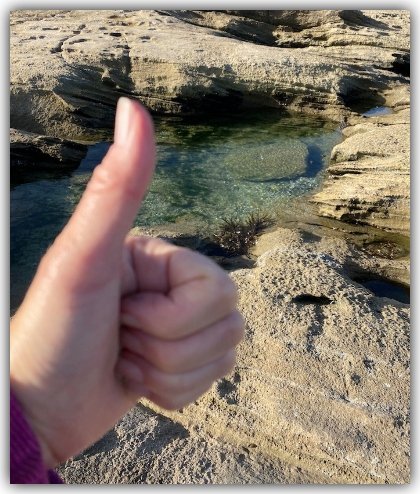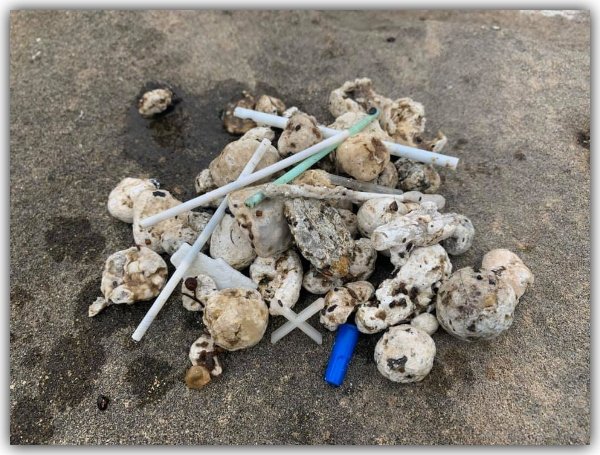
Carol Altmann – The Terrier
That is eco-activist Colleen Hughson’s thumb and that is one very clean rock pool at Shelly Beach, near Thunder Point and both are worth a special mention tonight.
I want to acknowledge a small moral victory by Colleen, (who doesn’t know I am writing this, but who is surely one of the most determined people on this planet), and the diligent beach clean up crew who have been pushing for years for Wannon Water to clean up its act.
Ever since zillions of plastic nurdles landed in the ocean via the sewerage system in 2017 by some assbob who has never been held to account, Colleen and other like-minded souls have been pressing Wannon Water to lift its game.
This is because it wasn’t only nurdles, but a whole pile of other gunk that was making its way through the Wannon Water treatment plant and out into the ocean.
Cotton buds, tossed down the toilet by other, unthinking assbobs, are one major offender.
Another is a delightful thing called a fatberg, which is a stinky, smelly, fatty, hairy blob that forms in the scum of the Wannon Water treatment plant and – if not caught – ends up floating in the rockpools of Shelly Beach.
The Pick Up Sticks and Good Will Nurdle Hunting crew knew this stuff must have been coming via Wannon Water, but Wannon Water ducked and weaved and pretty much denied it was doing anything other than an exemplary job at catching the smelly gunk before it was flushed out to sea.
Wannon Water’s take on it was that fatbergs and any other gunk showing up at Shelly Beach must have been from elsewhere or it was “old” stuff being flushed back to shore. (Spin, rinse, repeat).
Rarely did their screening system fail, they said, when I toured the plant last October.
Except Colleen and the beach clean-up crew knew it was failing.
They could see the screens failed when they became completely blocked and overflowed (just like any sieve or kitchen drain).
And it failed every time the two screens, including a fine screen, had to each be taken out manually, scraped into a wheelbarrow or vacuumed, and put back again.
How such a clunky system involving a wheelbarrow and a vacuum cleaner was ever considered good enough in the 21st century is beyond me, but it was, for years and years.

After the nurdle spill in November 2017, Wannon Water announced plans to improve the screening system as part of its plant upgrade, but these changes were slow in coming.
A second, manual fine screen was finally added earlier this year, and a fully automated, $1.1 million screen was installed in April …. and no wonder.
Because what happened in between times was a big, fat pollution abatement notice was issued to Wannon Water by the EPA in February.
This notice confirmed what was always suspected: the manual screens were not always doing their job.
In fact when the EPA visited the treatment plant last November, the screens were 100% blocked and effluent, it said, may have flowed over the top.
Whats more, the EPA went back to the plant in January this year and actually saw the effluent overtopping the screens.
Not only that, the EPA visited the rock pools at Shelly Beach that same day and, guess what?
They found five fat balls and many smaller pieces of fat in just one rockpool: slam dunk proof of a failing system.
This is a story that I wanted to write two months ago, but it got bumped in the Covid 19 news whirl.
But it’s an important vindication of the hard work and pressure and activism by Colleen and the dozens of other activists who form the clean up crews: they were right all along, and now the EPA notice proved it.
The EPA notice ordered Wannon Water to fix its screening system by no later than 15 June this year, which it has done, and the Shelly Beach rockpools are the cleanest they have been in years.
There is no doubt in my mind that the sustained pressure of Colleen and the beach clean up crew has helped this to happen.
And yet, even now, Wannon Water can’t quite bring itself to say just that.
“The manual screening system, installed in November 2017, has performed extremely well and has been very effective,” managing director Andrew Jeffers said to me via email.
No, actually, it didn’t perform “extremely well” and it should have been improved years ago.
The fight to clean up our beaches from plastics and pollution goes on, but the small victories and vindications are worth celebrating and so, as Rod Stewart would say, tonight’s the night.

